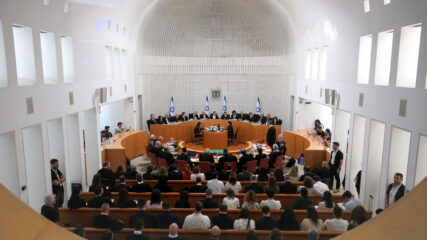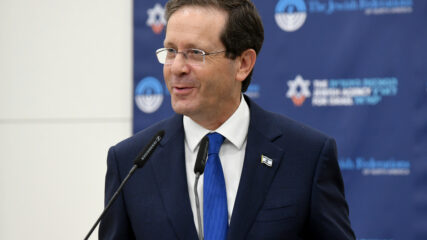Assembled here are key sources that have shaped the modern Middle East, Zionism and Israel. We have included items that give texture, perspective and opinion to historical context. Many of these sources are mentioned in the Era summaries and contain explanatory introductions.

After Israeli Attorney General Gali Baharav-Miara met with newly elected Justice Minister Yariv Levin about the Netanyahu government’s proposal to overhaul the judicial system, the attorney general crisply and cogently offers her opposition to that proposal.

Amid the massive public protest of the Netanyahu government’s suggested changes to the judicial system, former Israeli Supreme Court judges join the attorney general in expressing opposition to the government proposals and call for a committee to review the judiciary and suggest a balanced plan for changes.

In a rare address to the nation, President Herzog calls for deliberate compromise in the wake of the Netanyahu government’s proposed massive overhaul of the judicial system. The overhaul generated the largest public outpouring of opposition to a proposed government policy since Israel considered accepting German reparations in 1951-52.

After his urging compromise on the proposed judicial overhaul, President Isaac Herzog, in the starkest of terms, says Israel is approaching the “abyss of a civil war” as opponents and proponents head toward a showdown. He characterizes the proposed overhaul as “wrong, oppressive, and undermines our democratic foundations.”

President Herzog offers a compromise to the coalition’s proposed judicial overhaul in the forms of enacting a new Basic Law, and writing amendments to existing Basic Laws. Its detail suggests considerable behind the scenes discussion, and if only portions are enacted upon, this document could be seen in the future as a benchmark in Israel’s “constitutional” history.

Citing deep disaffection among elements of Israeli military reserve units and expressing those concerns to Prime Minister Netanyahu privately, Defense Minister Gallant makes his opinion public, causing Netanyahu to fire him, resulting in hundreds of thousand of Israelis in the streets. Two days after Gallant’s speech, Netanyahu calls for a pause in pushing forward the judicial overhaul legislation.

Prime Minister Netanyahu offers two speeches to the nation within four days, first emphatically pushing ahead with the judicial overhaul process, then calling for a pause.

The Prime Minister presented the view that his coalition carried out a necessary step to ‘restore a measure of balance’ between governmental institutions. He indicated that discussions about the other elements of the proposed judicial overhaul would take place between now and November. Specifically he asked members of the Israel Defense Forces to remain outside of the current political controversies.

Supreme Court President Yitzhak Amit warns about the danger to the Israeli public and democracy of sustained political attacks on the judiciary and individual judges.

Former Supreme Court President Aharon Barak makes the case against the Netanyahu government’s efforts to overhaul the judiciary, arguing that Israeli democracy requires judicial independence and protection for minority rights.









